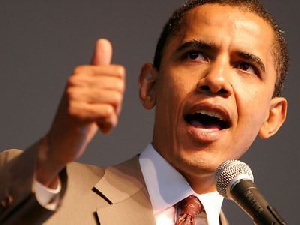For many Africans living in the U.S, Barack Obama’s election as the first African-American President is a significant milestone in history. The election of Mr. Obama and his swearing in as America’s 44th President on Tuesday January 20, 2009 —has touched Africans deeply and revived hopes of change in Africa.
The reaction to Mr. Obama’s election among Africans has been at turns emotional and soul-searching. Many say their faith in the American dream and what it represents—upward mobility and personal success if one works hard—has been renewed.
“When he first started, I thought it was a wasted vote,” said Cecilia Gugu Vilakazi, a South African native and business owner. For Vilakazi, a naturalized American who moved here from South Africa more than 30 years ago, Mr. Obama’s election “is almost like a fluke.” “It’s not real for people who know the history of this country. No one thought it would happen.”
“It’s almost like waking up and wondering whether I am still dreaming,” said Kofi Okyere, 60, a chef from Ghana who relocated to the U.S, 30 years ago. “I still haven’t quite woken up yet. I’m still in a daze.” For Okyere, who donated $500 dollars to Mr. Obama’s campaign and volunteered as an election judge at his precinct in Baltimore; the idea of an African American president in the 70’s when he moved here was unthinkable. Mr. Obama’s election, Okyere said, showed that “there is something about America that is uniquely dynamic about this country which is capable of moving people in directions we can’t even think of.”
“It’s a vindication of what America stands for,” said Isaac Oppong, a native of Ghana and a naturalized American who voted for the first time on November 4. For Oppong, Mr. Obama’s election means that his son who is biracial “can be whatever he wants to be in America.” Mr. Obama’s election demonstrates, Mildred Okwo, a lawyer and a Nollywood filmmaker said by email, that “in spite of all its deficiencies,” America is “still the greatest country on earth for any human to thrive regardless of creed, color or status.” For Okwo, who moved back to Nigeria to join that country’s burgeoning film industry after living in California for 20 years— African and minority children no longer have an excuse to fail. “If you think it, plan it, organize, work and execute it, you may just achieve it.”
Africans should not expect too much from Mr. Obama, warns Vilakazi. “I don’t think we should expect anything great. It’s going to be a continuation of Africa policy,” she said. Mr. Obama, Vilakazi notes, “has some learning to do,” when it comes to the reality of the political situation in Africa. “He is going to be like any President. He would make mistakes. He is going to falter. But he has a good team and he is very bright.”
“I don’t think we can look at Obama as another conduit to a handout,” Okyere said. Okyere hopes however that the symbolism of Mr. Obama’s election motivates Africans “to take responsibility for themselves.” “Africans should start believing in themselves again, that what everybody else has done, we are capable of doing.”
Mr. Obama, Oppong notes “might hold Africa to a higher standard.” “He has a connection there that others do not. He has family in Africa, so he sees the real pain. He might put the good of America to better use,” he said. On a general level, however, Oppong adds, there would not be any dramatic change in U.S-Africa relations. Mr. Obama however, possesses a unique ability because of his heritage “to speak beyond the presidents in Africa and reach people directly,” Oppong said.
Mr.Obama, Okwo hopes, “would recognize that Africa is the next frontier and use his influence as a person of African descent to push forth policies that will benefit both continents.”
Diaspora News of Sunday, 25 January 2009
Source: Leonard Quarshie

















